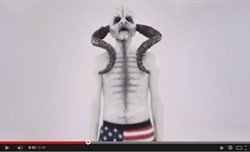
Subscribe & Follow
#AfricaMonth
In the news
Artist's moral rights are separate from copyright

As far as originality in music goes, you probably don't get more original than the South African music group Die Antwoord. However, in expressing their artistic creativity in a teaser trailer to promote their album Ten$ion, they stepped on the toes of the well-known South African sculptor, Jane Alexander. Alexander created the iconic sculpture, the Butcher Boys, many years ago. It depicts three life-size human-like beasts with black eyes and horns, seated on a wooden bench and is currently in the collection of the Iziko Museum in Cape Town.
In their video, Die Antwoord used costumes and masks that resembled the one creature, without Alexander's consent. Alexander, through her lawyers, objected to the use of her work in this way. According to reports in newspapers she was concerned that the use of her work might be publically perceived as reflecting her own artistic intentions. Die Antwoord said that the dark-horned creature in their video was definitely influenced by the Butcher Boys sculpture and that they had intended to pay homage to Alexander.
Matter resolved
Following receipt Die Antwoord took down the video clip on YouTube in respect for Alexander and her work at the time.
This time, the matter was resolved without the need for a court battle, but it does highlight the significance of an artist's moral rights. Although Alexander's lawyers did not refer to her moral rights, South African copyright laws protect the moral rights of an author/creator. The artist may object to any distortion, mutilation or other modification where it will be prejudicial to his/her honour or reputation.
The artist's moral rights are separate from his or her copyright in a work and, even if the copyright in a particular work is sold to another person, the artist always retains his or her moral right. It is an important aspect of an artist's intellectual property rights and ensures that an artistic work is not used in a manner that will offend or defame the artist.










